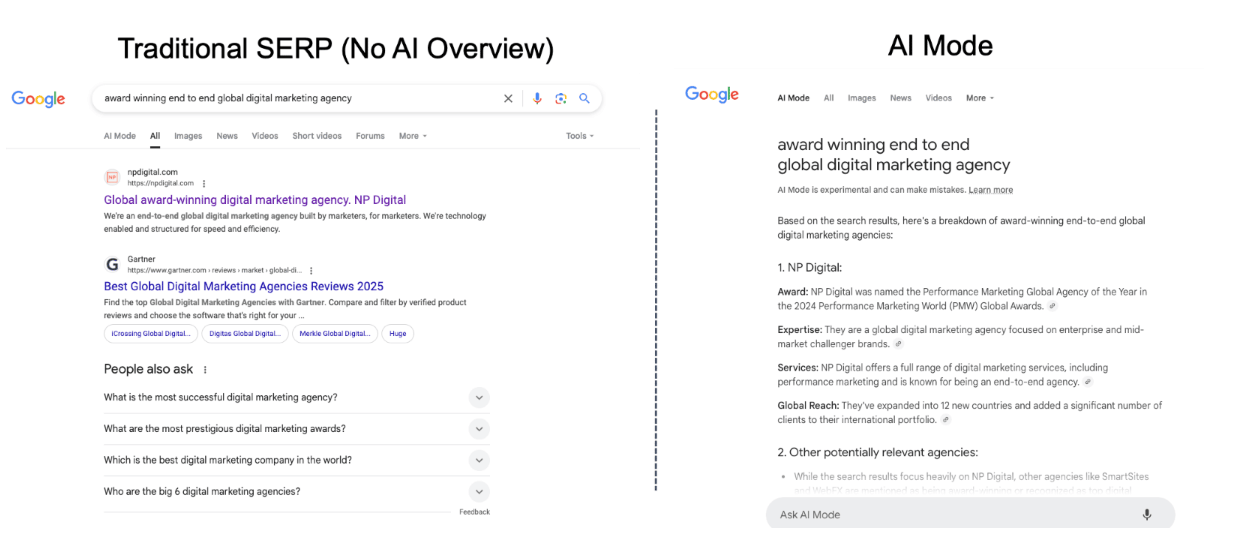Google’s New AI Search Mode
Google is rolling out a new AI-powered search mode, and it’s set to change how people search, how businesses rank, and how SEO works. With AI-generated answers, conversational search, and a shift in the way Google delivers results, businesses and marketers need to prepare for a new search landscape.
This blog explores the impact of Google’s AI search mode on SEO, market share, accessibility, and key features, providing clear insights into what’s coming next.
Comparison of Google’s traditional SERP vs. AI Mode. AI-generated summaries provide direct answers, reducing reliance on organic search rankings.
What Is Google’s New AI Search Mode?
Google’s new AI-powered search experience integrates generative AI into search results, offering users detailed, AI-generated responses instead of (or alongside) traditional web links.
This means:
- Instead of simply listing websites, Google will generate full-text answers based on various sources.
- Users will be able to ask follow-up questions directly in search.
- Some traditional organic results may be pushed further down in search rankings.
Google is taking a Search Generative Experience (SGE) approach, blending AI-powered summaries with existing web content.
How Google’s AI Search Will Change SEO
1. Organic Click-Through Rates (CTR) Will Drop: AI-generated answers may reduce clicks to traditional search results.
2. Content Quality Will Matter More Than Ever: AI models prioritize reliable, well-structured, and high-quality content.
3. Conversational and Long-Tail Queries Will Dominate: SEO strategies should shift toward answering full questions.
4. Brand Visibility Will Rely on AI Summaries: Businesses will need to optimize content so their brand gets mentioned within AI-generated results.
How This Affects Google’s Market Share
Google dominates the search market with over 90% market share, but this AI shift could reshape the competitive landscape.
Potential Outcomes:
- Google maintains its dominance by improving user experience.
- More users shift to competitors like Bing, DuckDuckGo, or ChatGPT.
- More reliance on paid ads as organic traffic decreases.
Who Gets Access to Google’s AI Search?
Currently, Google’s AI-powered search is available in limited beta through:
- Google Search Labs (Sign-up required).
- Selective rollouts in the US and a few other markets (18+).
- Users with the latest Chrome and Google Search app versions.
A full public rollout is expected later this year.
Key Features of Google’s AI Search Mode
- AI-Generated Summaries: Replaces traditional snippets with full AI-written responses.
- Follow-Up Question Capabilities: Users can refine their searches dynamically.
- More Visual Elements: AI-powered search integrates images, videos, and charts.
- Source Citations: Google claims it will link to sources within AI answers.
- Integrated Shopping & Local Business Recommendations: AI suggests products and services.
Breakdown of Google’s AI Mode features, including AI-powered summaries, follow-up questions, Gemini 2.0 integration, multimodal queries, and opt-in access.
What Businesses and Marketers Should Do Now
1. Focus on Expertise & Authority: Google prioritizes content from experts.
2. Optimize for AI Summaries: Structure content with clear answers to commonly asked questions.
3. Use Schema Markup: Help Google understand your content better with structured data.
4. Create Engaging, In-Depth Content: AI summarizes—if your content goes deeper, users may still click through.
5. Monitor Traffic & Adapt: Track your organic traffic changes and adjust accordingly.
Google’s press release can be found here.
Conclusion
Google’s AI-powered search mode is a game-changer for SEO and digital marketing. While it offers users faster answers, it also reduces organic click-through rates and changes how businesses must optimize for search.
Marketers and brands must adapt to new SEO strategies, focus on content quality, and explore paid advertising to maintain visibility in AI-driven search results.
Now is the time to start preparing—because once AI search fully rolls out, the old SEO playbook will no longer be enough. If you have questions or concerns about how this shift will affect your business or SEO performance, contact us.


